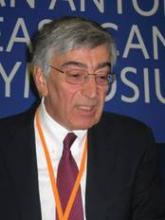Adding the monoclonal antibody pertuzumab to standard neoadjuvant therapy with trastuzumab plus docetaxel increased the rate of complete tumor response in the proof-of-concept NeoSphere study of women with locally advanced, inflammatory, or early HER2-positive breast cancer, as published online Dec. 6 in Lancet Oncology.
The addition of pertuzumab, which has a different binding site and a complementary mechanism of action to trastuzumab (Herceptin), did not appear to increase the number or severity of treatment-related adverse events in the industry-sponsored, open-label, phase II study, said Dr. Luca Gianni of San Raffaele Cancer Centre in Milan (Italy), and his associates.
"The tumor response to this new triplet combination is one of the highest reported to date, despite just a short treatment time, and could be a big advance for women with HER2-positive disease," Dr. Gianni noted in a press statement accompanying the report.
In the international study, 417 treatment-naive patients at 59 medical centers were randomly assigned to receive 12 weeks of conventional therapy with neoadjuvant trastuzumab plus docetaxel (Taxotere), or pertuzumab and trastuzumab plus docetaxel, or pertuzumab and trastuzumab with no chemotherapy, or pertuzumab plus docetaxel before undergoing surgery. In all, 25 patients, "mostly in the chemotherapy-free group," did not complete surgery as planned. Following surgery, patients in all groups received adjuvant conventional treatment including anthracyclines and trastuzumab for 1 year.
The primary efficacy end point was complete pathologic response within the breast, defined as the absence of invasive neoplastic cells at microscopic examination of the primary tumor at surgery. This was achieved in 46% of women given the triplet, compared with only 29% of those given conventional therapy, 17% of those given both monoclonal antibodies but no chemotherapy, and 24% of those given pertuzumab plus chemotherapy.
Thus, the triplet was more effective than was conventional treatment, as well as being more effective than chemotherapy plus either monoclonal antibody alone, Dr. Gianni and his colleagues said (Lancet Oncol. 2011 Dec. 6 [doi:10.1016/S1470-2045(11)70336-9]).
The triplet was particularly effective in the subgroup of women with hormone receptor–negative tumors, with a complete response rate of 63%, they noted. In addition, dual HER2 blockade by pertuzumab and trastuzumab completely eradicated breast tumors in 27% of patients who did not receive docetaxel for these tumors.
The 17% complete response rate among all patients given both monoclonal antibodies without chemotherapy was notable. It suggests that a proportion of HER2-positive tumors can be eradicated without any chemotherapy, "which might have immediate use for women who cannot receive cytotoxic drugs," the investigators added.
Approximately one-third of this subgroup of patients did not respond to the dual-antibody regimen, and that may be attributable to the short duration of neoadjuvant treatment. This possibility will be assessed in clinical trials with longer-term therapy, the researchers said.
As expected with docetaxel, the most common adverse events of grade 3 or higher were neutropenia, febrile neutropenia, and leukopenia. The rates of adverse events (12%-14%) and serious adverse events (10%-17%) were similar across the three groups that received docetaxel, and were markedly lower in the group that didn’t receive it (2% and 4%, respectively).
In particular, cardiac toxicity was considered "good," but a longer observation period will be necessary to rule out the possibility that adding pertuzumab may increase cardiotoxicity. The mean maximal decrease in left ventricular ejection fraction (LVEF) was 4%-5% and was similar across all treatment groups. "No significant change was detected when pertuzumab was added to trastuzumab, and no patient had an LVEF decrease to less than 40% at any time during the study. Four patients [three receiving conventional therapy and one receiving triple-combination therapy] showed LVEF declines of 10%-15% from baseline and to less than 50% during the neoadjuvant period," Dr. Gianni and his associates said.
In July, Roche announced that it plans to see Food and Drug Administration approval based on a survival advantage for the triplet in the phase III CLEOPATRA trial. Data from that study will be presented this week at the San Antonio Breast Cancer Symposium.
This NeoSphere study was funded by Hoffmann-La Roche, maker of pertuzumab; the company provided the study drugs and was involved in the study design, safety monitoring and reporting, and data management and anaylsis. Fondazione Michelangelo also provided support. Dr. Gianni is an advisory board member for Roche, Genentech, GlaxoSmithKline, Boehringer Ingelheim, Wyeth, and Novartis. Three coauthors are Roche employees; two disclosed Roche stock ownership.


